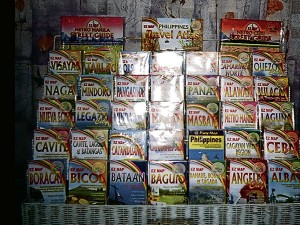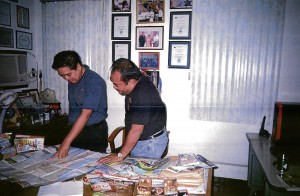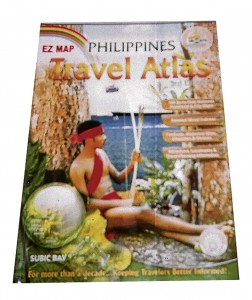It started during the ’90s, when the Department of Tourism asked Ariel D. Jersey, a budding cartographer, to do a “Best of the Islands” brochure-map for the delegates of the Apec Summit Conference.
Jersey did not even have a computer then (these were not as new-fangled then as they are now), so he rented one from a German friend and got down to work, utilizing photos and data from the DoT, and doing some validation on his own. And he was able to produce an ecotourist publication which satisfied his client.
And so he told himself: Why not go full-time and commercial, as maps had always fascinated him?
So he gathered a staff, and made himself publisher and sole proprietor of United Tourist promotions (ajersey@ezmaps.ph) which produces EZ Maps, and has a head office in Angeles City and a branch in Manila (tel. 02-556-3025).
“It was hard at first,” Jersey recalls. “We did not have computers right away. We planned the maps for each city or town, and we did ocular surveys and validated road data, because some roads were still in the planning stage.”
Soon they got into software and digitalization. “We indexed isa-isa (one by one), the road, the establishments, the landmarks,” he points out. “You have to be comprehensive, accurate, otherwise the buyer will complain.”
Through the years, the company has been able to put out more than 50 titles.
These include travel-ecotourist maps on each region, and on major cities and towns from the Ilocos and Cagayan Valley to Davao and Zamboanga. There are Festival Series, Travel Atlases, Road Atlases, Street Guides, and what-have-yous. These are updated every year.
The “flagship” is the 356-page “Philippines Travel Atlas,” now on its third edition, on the cover of which is an Ayta youth with bow-and-arrow reclining in a forest setting, with Subic Bay and ships in the background.
This volume contains 188 up-to-date national, provincial and city maps; detailed street indexes; information on festivals, churches and shrines; and information on other attractions, landmarks and travel planning.
Other bestsellers are the Metro Manila Street Guide and the Metro Cebu Street Guide. Big companies, like the fast-food and coffee giants, have also commissioned digital wall maps (with unlimited size) which highlight the locations of their outlets.
These publications are found in the major bookstores like National Bookstore, PowerBooks, Bestsellers (in Robinsons’ Galeria) and Fully Booked, and in major hotels from north to south.
To Jersey’s surprise, there are more local buyers of the maps than foreign tourists. The buyers include students, businessmen, companies, domestic as well as foreign tourists, and the general public.
So, how’s business? Is it profitable? “Good enough to make a living,” notes Jersey. And this strikes one as being a modest assessment.
Photos By Amadís Ma. Guerrero, Contributor




